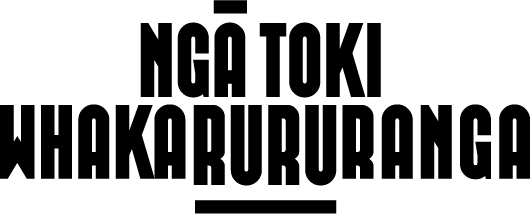Tiriti o Waitangi assessments on IPEF and AANZFTA
On July 31 co-convenor Pita Tipene presented the Tiriti o Waitangi assessments of the Indo-Pacific Economic Framework (IPEF) and the ASEAN Australia New Zealand Free Trade Area (AANZFTA) to the select committee on behalf of Ngā Toki Whakarururanga. This is part of Ngā Toki Whakarururanga’s mandate under the Mediation Agreement with the Crown to prepare Tiriti o Waitangi assessments of new trade agreements against the four articles of Te Tiriti o Waitangi. Ngā Toki Whakarururanga also signed a Toka Tūmoana with the Ministry of Foreign Affairs and Trade to provide expert and strategic direction on Māori rights, duties, interests and responsibilities in relation to negotiations of the IPEF and to co-design relevant New Zealand text proposals.
In his presentation, Pita set out the failings of process and content in both agreements. The Crown’s National Interest Analysis describes the IPEF agreements as strengthening supply chain resilience, taking concerted regional action in response to climate change and improving the business environment that traders and investors experience in regional market. But, as Pita explained, the IPEF “Clean Economy” promotes concepts and strategies, such as ocean-based and nature-based solutions, that involve exploitation of te taiao in ways that are incompatible with rangatiratanga, tikanga and kaitiakitanga, and deprive those with mana whenua of their authority and responsibilities in relation to those resources. They are not sourced in, and are often hostile to, Indigenous knowledge or practices. The agreement also fails to empower Indigenous Peoples to provide leadership in the face of the climate crisis.
The AANZFTA, a free trade agreement (FTA) aiming for sustainable economic growth and investment regimes among the twelve signatories including Aotearoa, continues to give foreign investors the right to sue the government over measures that negatively affect their profits, such as laws and decisions on mining.
Pita Tipene told the committee: “Our bottom line in both agreements is that the Crown needs to bring the Tiriti relationship of rangatiratanga and kawanatanga into the 21st century through trade agreements that are truly transformative, not a continuation of the status quo.”
He stressed the need for Māori to have control over international rules that govern our responsibilities, duties, rights and interests under Te Tiriti and He Whakaputanga.
Imagine Natives Think Tank wānanga
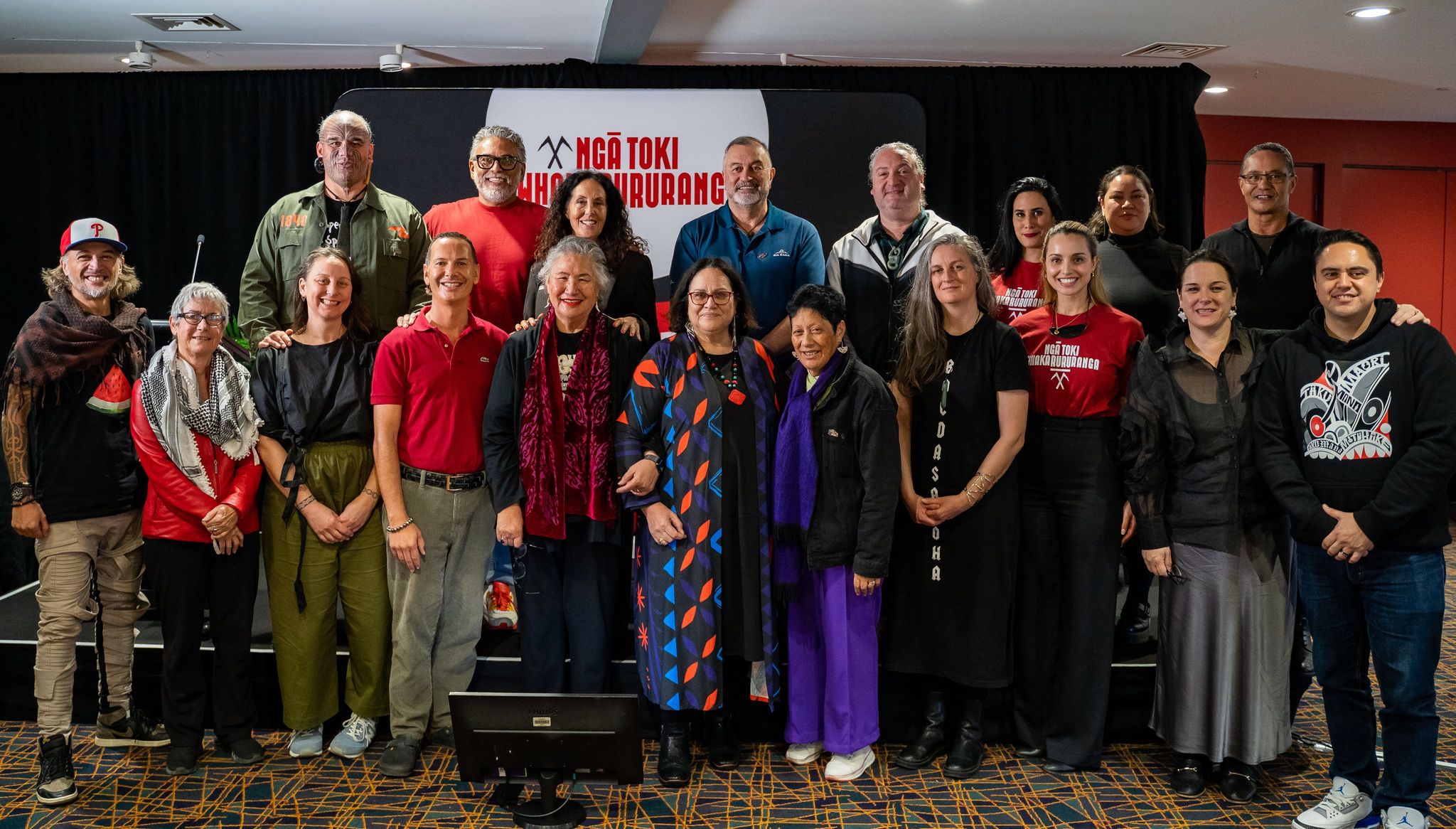
Attendees of the Imagine Natives Think Tank wānanga. Photographer: Eruera Walker
On July 18 Ngā Toki Whakarururanga brought together a range of fabulous creatives from different sectors, including waiata, haka, tā moko, kaikanikani and whakairo, for a full day hui in Tāmaki Makaurau. The aim was to build an understanding of how FTAs interact with and impact on their mahi, learn from their personal experiences about how their work may have been exploited or misappropriated in the international domain, and discuss how to protect their mahi and taonga in the future. This is one of the Te Pae Tawhiti projects funded by Te Puni Kokiri over the past year and was generously supported by Tātaki Auckland Unlimited.
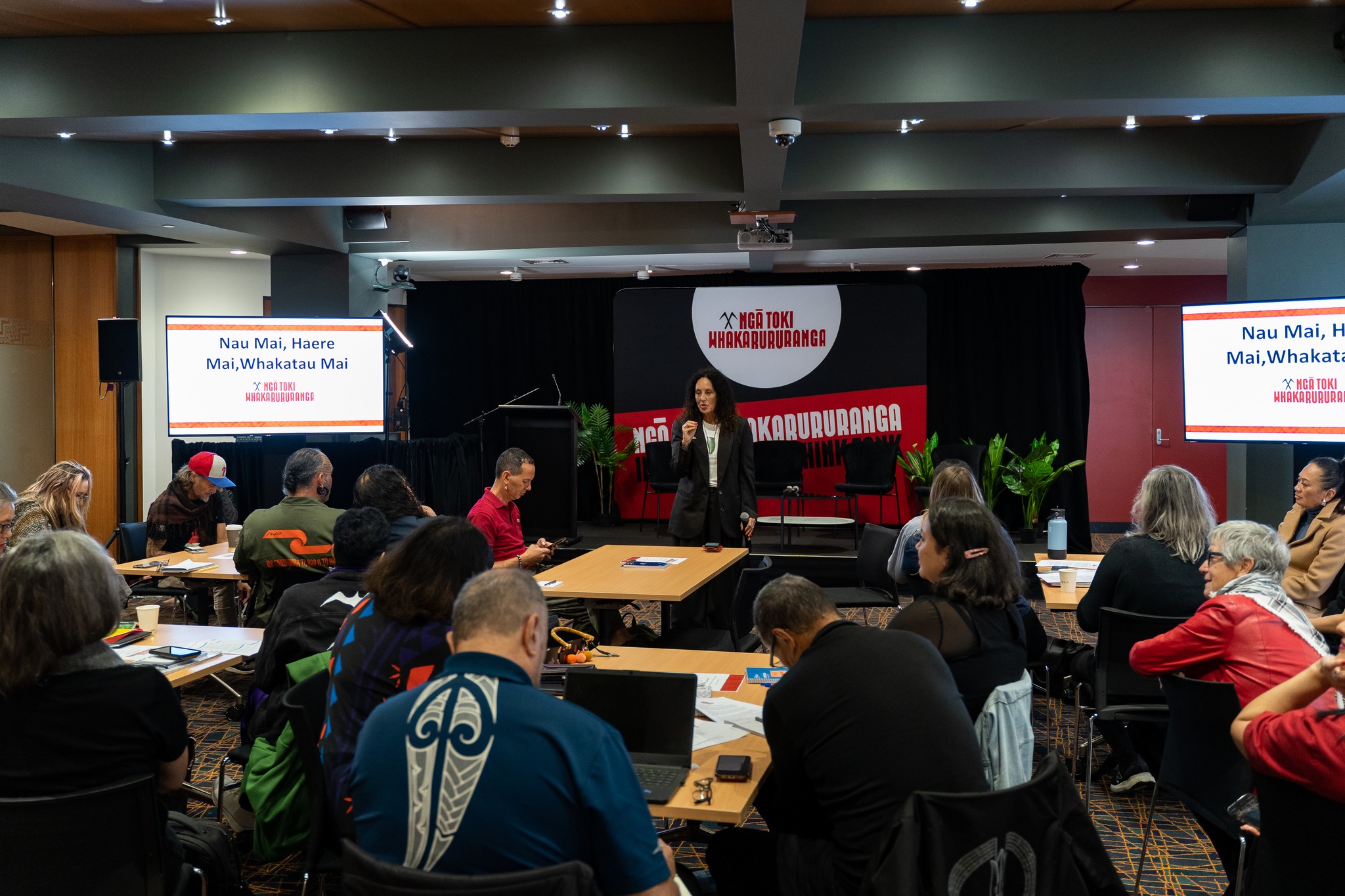
Co-covenor Moana Maniapoto leads a panelist discussion with Nigel Borrell, Wairere Iti and Horomona Horo. Photographer: Eruera Walker
The wānanga included presentations, panelist discussions and a brainstorming session. Ngā Toki Whakarururanga pūkenga Aroha Mead led a presentation about the Mataatua Declaration and the Wai 262 claim, including their recent survey of creatives. Elizabeth Ellis talked about the history Toi Iho, the Māori trademark that recognises, authenticates and uplifts Māori artists and the art they produce, and where it’s at now. Ngā Toki Whakarururanga pūkenga Emeritus Professor Jane Kelsey and Maui Solomon made several inputs on how FTAs impact on the Māori creatives sector. Co-convenor Moana Maniapoto facilitated panel discussions with advocates and experts including Lanita Ririnui, Peter Lucas-Jones, Paora Sharples, Horomona Horo, Wairere Iti and Nigel Borrell.
The hui ended with a brainstorming session by all attendees to discuss how to protect their taonga in the international trade space and how to build on the relationships and knowledge created and strengthened during the hui.
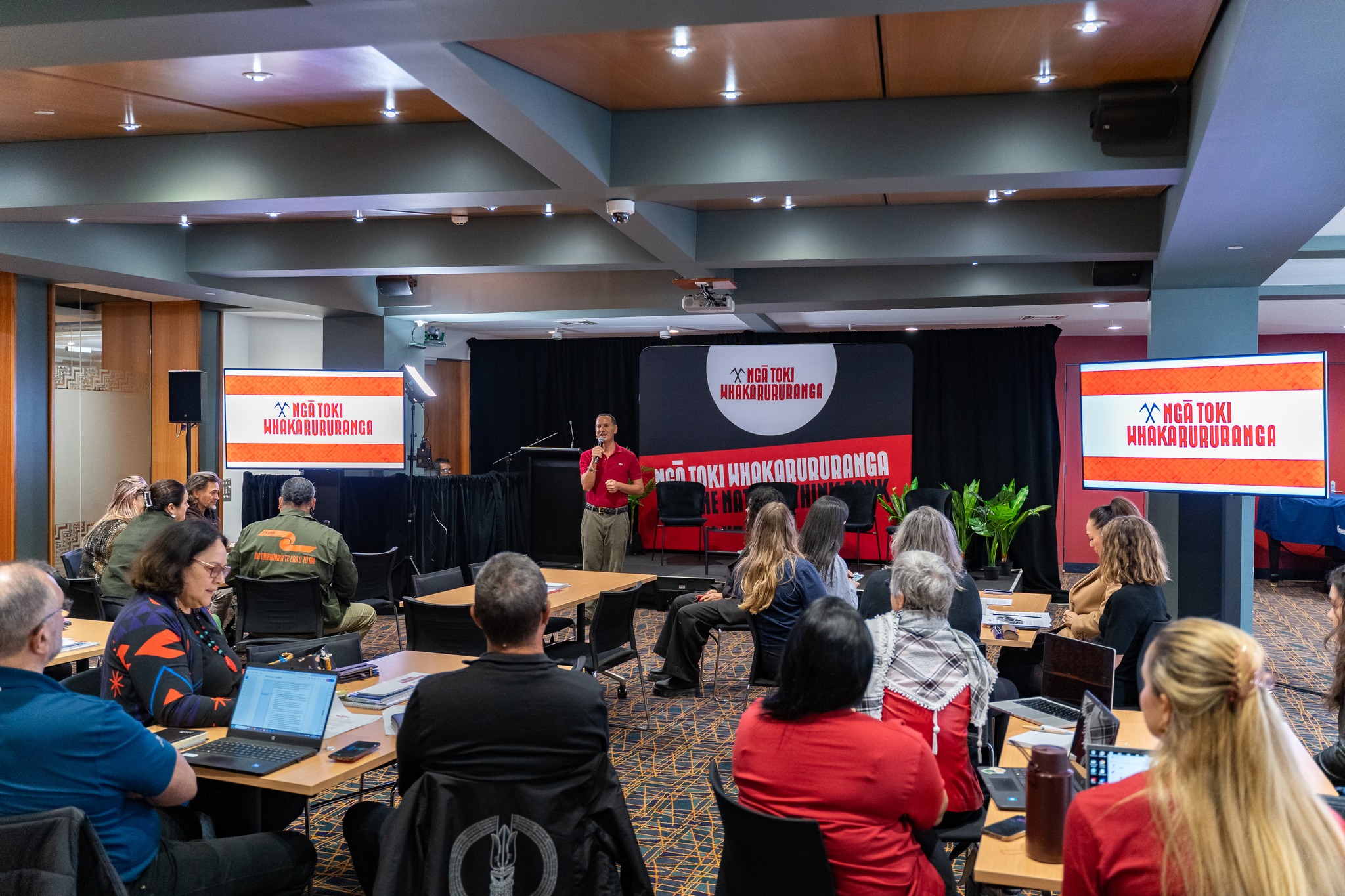
Guests in wānanga mode. Photographer: Eruera Walker
He mihi nui ki a koutou i tae mai. Thank you so much to everyone who participated in the wānanga. Your input and kōrero was highly appreciate and we are looking forward to continuing our mahi in the creatives space. Watch out for a series of clips we will drop into social media.
Digital wānanga
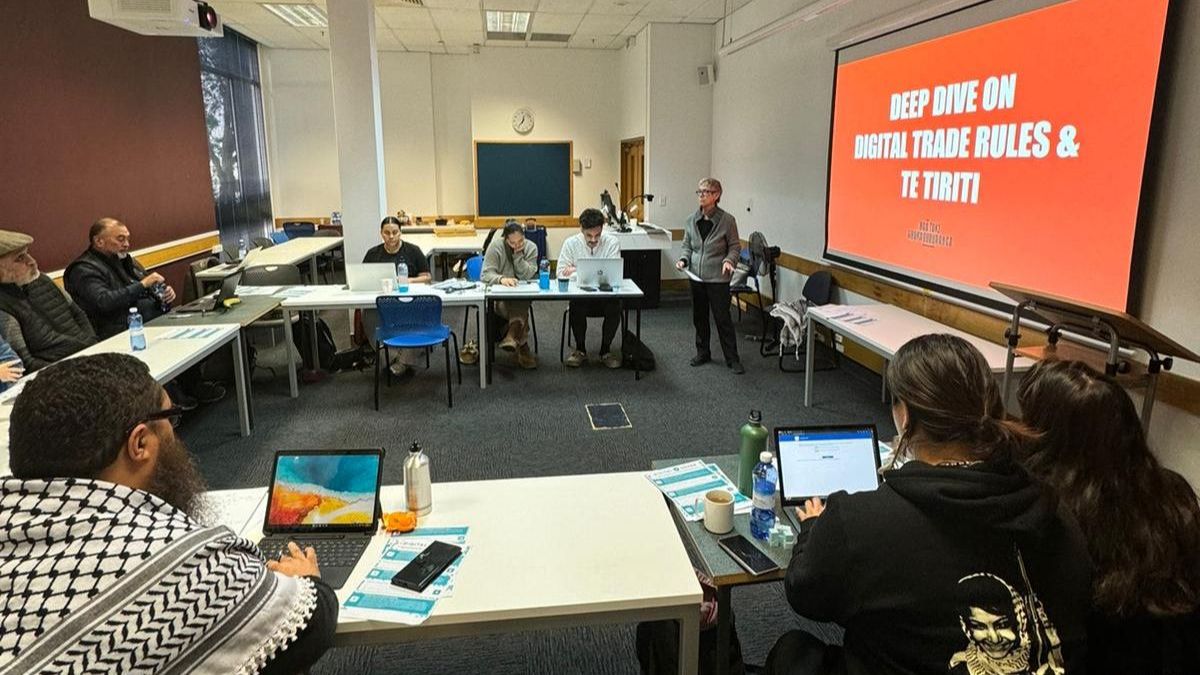
Pūkenga Dr Jane Kelsey with recipients of the digital deep dive wānanga. Photo source: File
As part of our commitment to building Māori knowledge and expertise in the digital trade space, Ngā Toki Whakarururanga held two wānanga in July facilitated by trade pūkenga Jane Kelsey and funded as one of our Te Pae Tawhiti projects.
The first wānanga was a two-day intensive deep dive into the digital chapters of the FTAs, attended by various members of the Ngā Toki Whakarururanga network including other pūkenga, members from the Wai 262 puna and lawyers. Later in the month we co-hosted another, one-day, wānanga with the Data Iwi Leaders Group to introduce pūkeko at Te Kāhui Raraunga (their internship programme) to the digital and data issues in the trade agreement sphere.
Participants from both workshops gave valuable insights, which we will use to focus our efforts in this space going forward. Some of the important challenges highlighted included: lack of expertise in this knowledge; the Crown binding Aotearoa by new agreements that negatively impact Māori in the digital space; and the challenge of translating these issues to whānau and marae communities.
Te Pae Tawhiti projects connect Tiriti, FTAs and core kaupapa
July marks the completion of our Te Pae Tawhiti project work, funded by Te Puni Kokiri, on four core kaupapa: Rongoā, Hua Parakore, Digital and Creatives. Over the past year we have held a series of hui and educational wānanga, and developed a range of resources and videos that aim to empower Māori to understand the Tiriti implications of (FTAs) and resist their negative impacts.
As part of the Hua Parakore project, Ngā Toki Whakarururanga joined Te Waka Kai Ora and the Papawhakaritorito Charitable Trust in April to co-host the first day of He Whenua Rongo Indigenous Seed Soil and Food Sovereignty hui. Our kaihautū and pūkenga participated as guest speakers and spoke about the impacts globalisation, capitalism and FTAs are having on Indigenous rights and the rights of nature, and on food, farming and our sacred traditional medicines. Watch here here.
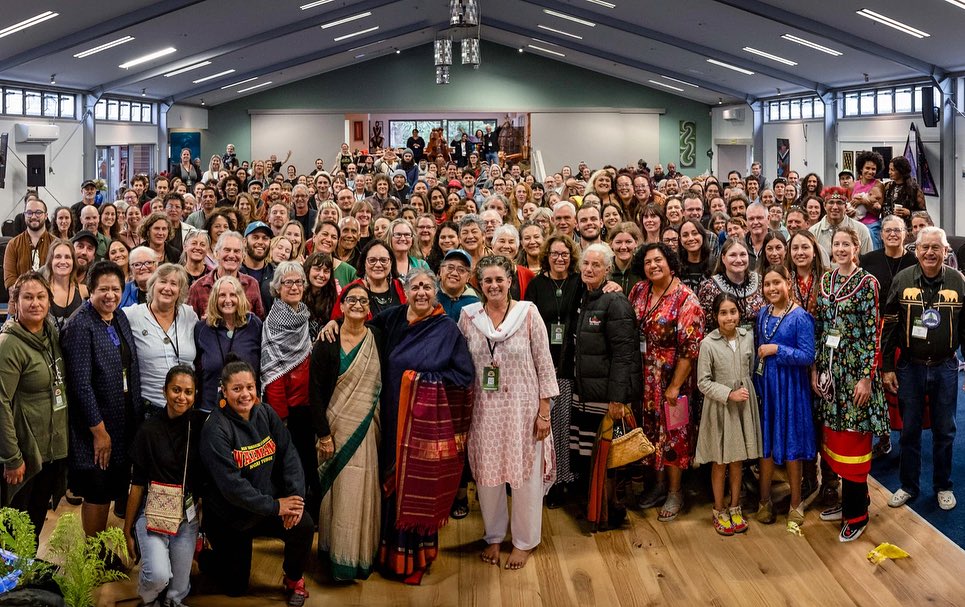
Hundreds unite for the sold-out He Whenua Rongo symposium. Photo source: Papawhakaritorito Trust
As part of the Rongoā project, in May Ngā Toki Whakarururanga participated in the ACC Rongoā Māori Conference, a celebration of traditional Māori healing and an opportunity for collaboration to support positive health outcomes for whānau and hapori Māori.
Kaihautū and rongoā Māori practitioner Donna Kerridge was a guest speaker and spoke about the impacts and threats FTAs have on the practice of rongoā Māori. We held a stall and shared resources to educate guests about protecting rongoā in the trade space. Guests showed genuine interest in the mahi being done by Ngā Toki Whakarururanga and a willingness to learn more about how trade impact rongoā Māori. We also did a sit down interview with Donna to discuss how policies have affected rongoā Māori in the past, current threats imposed by FTAs and advice to rongoā practitioners, healthcare workers and policy makers. Watch here.
These wānanga, along with the Imagine Natives Think Tank wānanga (Creatives) and Digital Deep Dive and introductory wānanga (Digital) mentioned in this newsletter, are the first of many events to come to connect, engage, educate and activate our communities on the impacts of free trade agreements. Follow our social media pages here as we push out more content & resources.
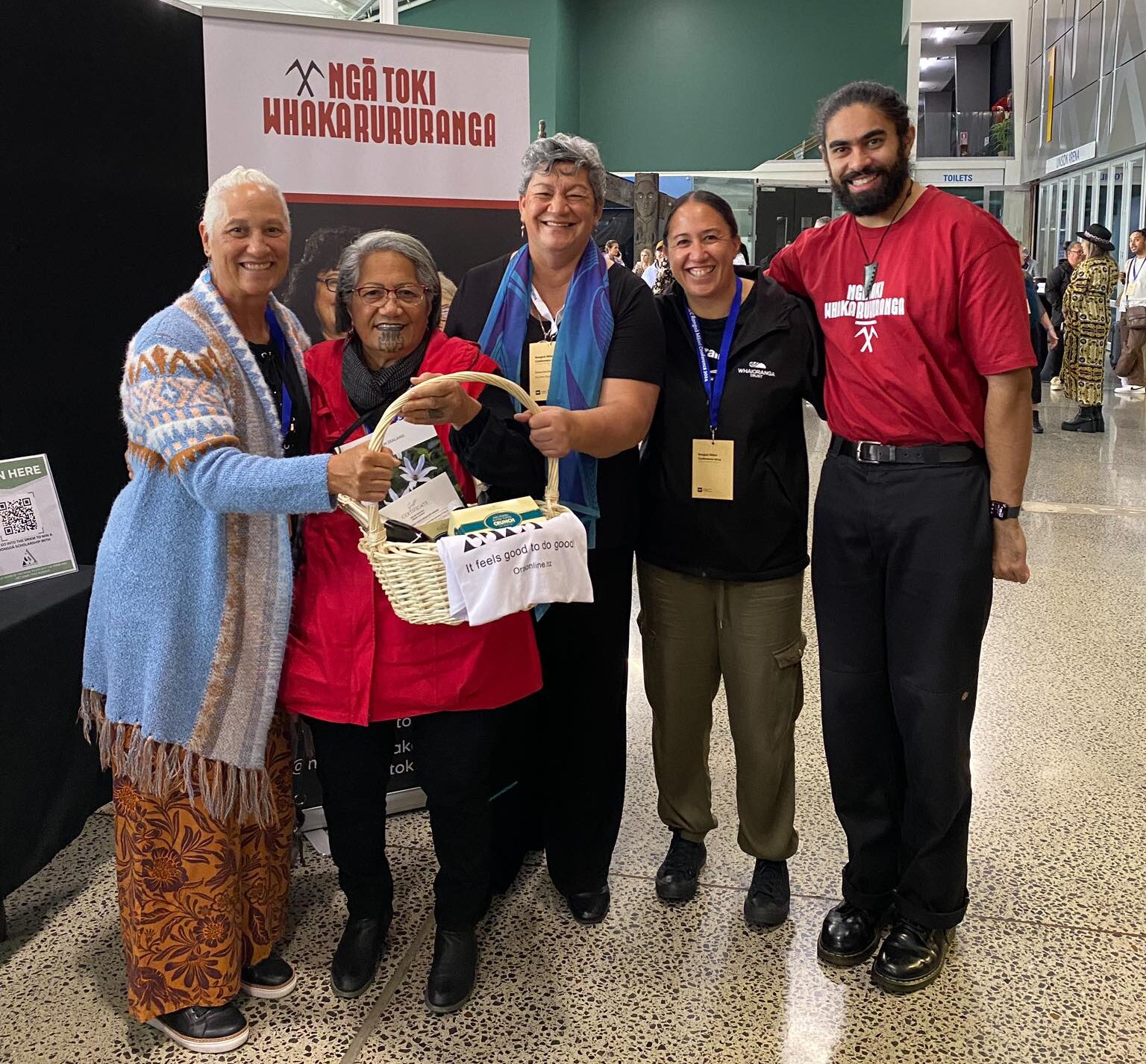
Donna Kerridge and Rheive Grey gifting competition winners a prize at ACC Rongoā conference stall. Source: File
